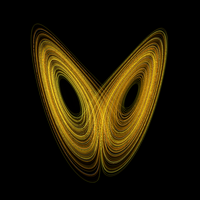Absolute nonexistence: The absence of existence, the absence of nothingness, and the absence of absence. It is what is not being referred-to under any circumstances. Its definition is that which cannot be referred-to, named, or defined. It is the non-state to which everything including nothingness is attracted.
Chaos Theory: The study and mathematical modeling of complexity in natural systems.
Complexity: The characteristic of a system endowing it with the capacity for infinite variation of motion and form.
Dis-equilibrium: A disturbance in absolute nonexistence. It is a result of the fundamental asymmetry between nothingness, absolute nonexistence and temporal existence.
Disordered Complexity: Random chaotic motion within a system either moving towards or coming from ordered complexity.
Energy: Motion; which is the detectable change in spatial relationships between the components of a given system and the means of redistribution of space and matter. Energy is also the measure of all the forms of repulsion and attraction between space and matter (known as potential energy).
Environment: The immediate surroundings of a given system from which the system comes, upon which it is dependent, and to which it will return its component parts.
Evolution: The universal progressive pattern of the exchange of disordered complexity for ordered complexity in all natural systems. It is the orderly increasing delineation of a system from its environment.
Existence: The set of circumstances in which it is possible for humans to maintain sentient consciousness of self and time. Existence is independent of temporality by virtue of its infinite nature except in the context of its temporal phase (see Temporal Existence).
Force: That which initiates or changes motion.
Gravity: The space/time gradient caused by the bending of space/time towards mass/density. It is therefore also the measure of mass/density (referred to as the specific gravitational density of a given area of matter).
Matter: The absence of space. It is attracted to space and repelled by itself.
Mass: The aspect of matter detectable by measurement.
Motion: The detectable change in spatial relationships between the components of a given system. Also see “energy” (above).
Nothingness: A state of perfectly uniform static equilibrium constituting relative nonexistence. A state that exists relative to absolute nonexistence but does not exist relative to temporal existence.
Ordered Complexity: A consistent pattern of arrangement of the elements of a system in relation to each other that is infinitely variable and that accrues from or dissolves to the disordered phase of those elements (see Disordered Complexity).
Particle: A discrete unit of matter with consistent characteristics unless divided or fused.
Physics: The study of motion
Relative Nonexistence: Nothingness; a state of uniform, static equilibrium undetectable by humans due to the absence of spatial/temporal dynamics.
Space: The absence of matter. It is attracted to matter and repelled by itself.
Stimulus: An electrochemical alteration of the dynamic basil or "resting" equilibrium of an organic system
System: Elements interacting with each other and delineated from their surroundings.
Temporal existence: The constraint of infinite time and space within which human beings can exist. A state delineated from nothingness by virtue of non-uniformity and whose components are attracted to nothingness. It is the dynamic phase of existence whereas nothingness is non-temporal and non-dynamic.
Time: is the measure of the universal progression of uniformity between matter and space accomplished by counting equal, standardized divisions of a cyclical system of regular motion.
Universe: The manifestation of temporal existence – composed of matter, energy, space, and time. It is anything that is or ever will be detectable by human beings. It is the macro-system of which all natural systems are a sub-set.
Nothingness Theory: The connection between the evolution of the universe and human thought, Corey Kaup, 1989 – 2005
...existentionally chaotic improvability?
Subscribe to:
Post Comments (Atom)

No comments:
Post a Comment